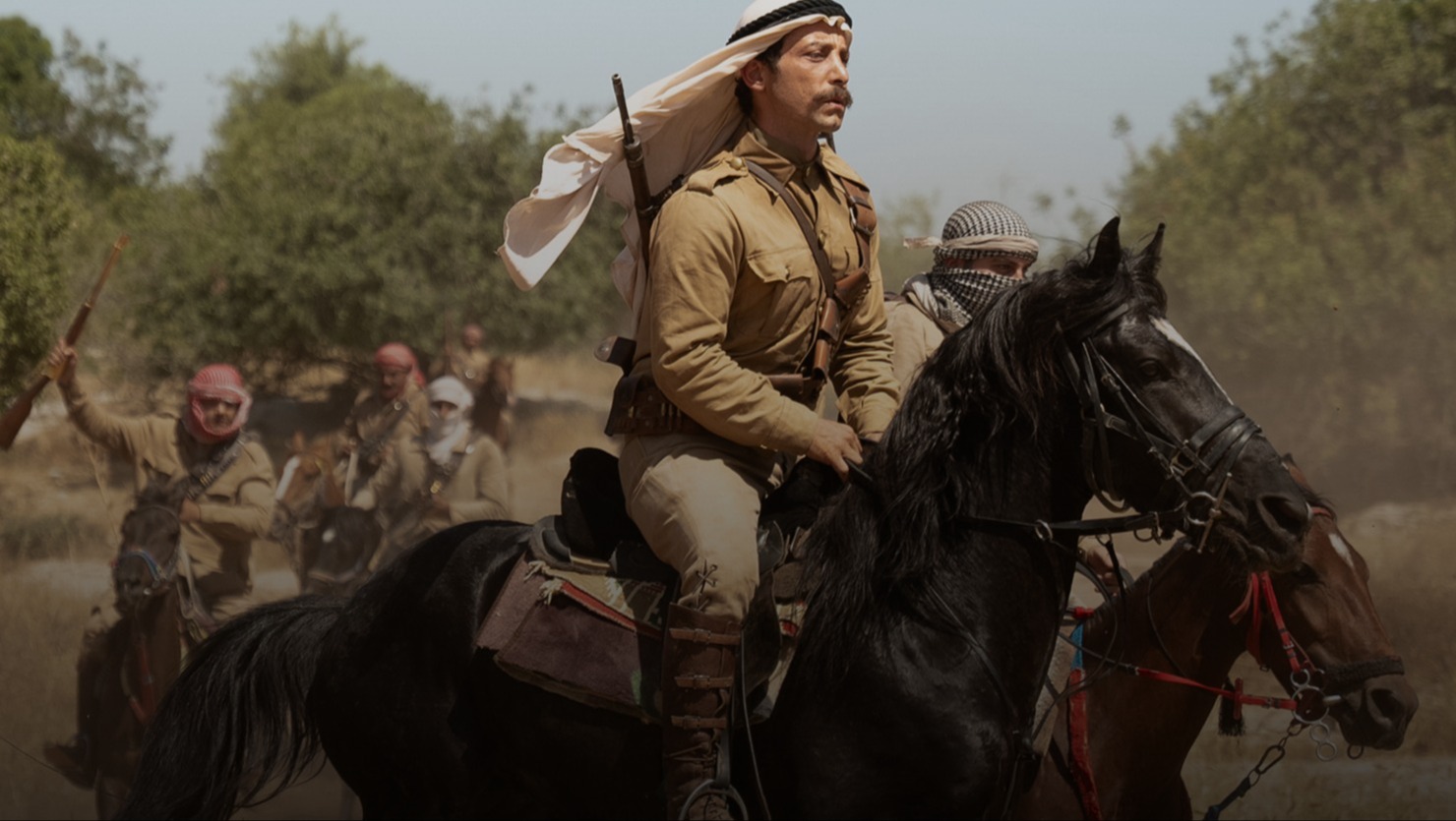
By Iqbaal Abdi
On October 22, Palestine 36 premiered in the UK, co-hosted by Britain Owes Palestine – an advocacy group based in London. Directed by award-winning Annemarie Jacir, Palestine 36 aims to amend revisionist accounts of Palestinian history.
Set during the 1936-39 Arab Revolts, the film follows Yusuf, a young man whose initial passivity towards colonial rule gives way to political awakening under the hand of the Crown, which shatters his aspiration, home and family.

Palestine 36 is set during 1936–1939. Above: an actual photo of a mass search for arms outside Damascus Gate, Jerusalem, Mandatory Palestine, on 9 September 1938. Citizens were temporarily detained at gunpoint. (Credit: G. Eric and Edith Matson Photograph Collection/Wikimedia CC)
Yusuf is depicted as an ambitious man from a village, captivated by the allure of the metropolis of Jerusalem, where he works. Yusuf is employed by a middle-class man, Sir Amir, and his wife – Kholoud, a journalist who uses the alias Ahmed Canaani to publish articles on British bias towards Jewish settlers.
Through Yusuf’s point of view, the differing treatment of rural and urban Palestinians, reflecting the British ‘Divde and Rule’ policy that distinguishes between ‘good’ subservient subjects and rebels. The middle-class urban Palestinians are seemingly treated with more respect compared with their rural counterparts. In contrast, the peasantry farming class are subjugated to British colonial rule more harshly – beaten, arrested and extrajudicially killed by officers, with farming land being confiscated and gifted to settlers.
Additionally, Palestine 36 depicts the nuanced approaches to colonial rule. While some urban, middle-class Palestinians, such as Sir Amir, being in favour of political engagement with the British Mandate and Zionist representatives, the farming class prefer militant action in their struggle for liberation. Over time, the film reveals a growing realisation among Palestinians of all classes that freedom will not be granted; Britain will always prioritise Jewish settler rights over their autonomy.
Palestine 36 ends on the poignant reminder of the war crimes committed against Palestinians. The massacre of Yusuf’s village mirrors historical accounts of the Massacre of Al-Bassa in 1938, where people were killed, mutilated and tortured by British soldiers. Despite their pain, the defiance of Yusuf’s villagers depicts the strong ties Palestinians feel with their land, exceeding their fear of death. Annemarie Jacir’s final scene demonstrates how this tie to the soil of Palestine is intergenerationally felt, establishing the cross-generational devotion of Palestinian resistance against occupation.
English actor Billy Howle, who stars as British diplomat Thomas Hopkins, states he “can’t ever unsee or unlearn what I have” during a trip he took to the West Bank as preparation for his role. Howle adds the British Mandate “is one of many instances in which the British left behind something appalling and then made no effort, no attempt, at the very least, to make a formal apology”. To correct wrongdoings, Howle suggested that colonial and Palestinian history be taught as part of the mandatory national curriculum.

Billy Howle, who stars as British diplomat Thomas Hopkins; Dr Victor Kattan, legal scholar and adviser to Britain Owes Palestine; and Yasmine Al-Massri, who plays journalist Kholoud, at the London premiere of Palestine 36. (Credit: Gretel Ensignia)
Actress Yasmine Al-Massri, who plays the role of Kholoud, expressed a similar sentiment. Al-Massri, who is of Palestinian heritage, when asked what Palestine 36 meant to her, replied that “this is not only about a movie. It’s an invitation for us to think together, to have that conversation. We have to start with education”.
Legal scholar and adviser to Britain Owes Palestine, Dr Victor Kattan, stated that “it’s essential that the British public understands the historical roots of the present. Only through acknowledging this past can we hope to contribute meaningfully to a just future”.
Recognising Britain’s role in the Palestinian struggle, Britain Owes Palestine has submitted a legal petition stating that (1) Britain’s mandate to rule Palestine was unlawful, (2) Britain’s oppression of the Palestinian people was unlawful and (3) Britain abandoned Palestine, creating the conditions for the country’s violent partition. The 430-page petition was submitted to the Prime Minister, Foreign Minister, Ministry of Defence and Attorney General, with the key petitioner being 91-year-old Munib Masri, whose life mirrors the fictional character of Yusuf in many ways.
The petition calls for three main demands. First, for the Prime Minister to issue a formal apology to Palestinians over the rule of the British Mandate between 1918 and 1948, the declassification of documents that remain concealed from public scrutiny; and third, for reparations to be made to Palestinians. Dr Kattan stated that the reparations could take different forms, such as the inclusion of Palestinian history in the national curriculum.
Palestine 36, alongside the legal petition, aims to spark national discourse on Britain’s role in the region and its responsibilities towards the people of Palestine. To this day, the legacies of the British mandate form the foundations of the discriminatory and oppressive policies enshrined in Israel’s statute book.
Feature photo: Still from the film ‘Palestine 36’ showing Palestinian horsemen. (Credit: Curzon Film)
Iqbaal Abdi, Graduate in Politics & International Relations